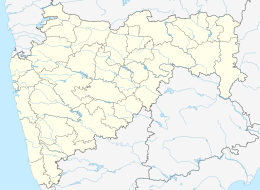Manmad Junction railway station
Manmad Junction | |||||||||
|---|---|---|---|---|---|---|---|---|---|
 | |||||||||
| General information | |||||||||
| Location | Manmad, Nashik District, Maharashtra India | ||||||||
| Coordinates | 20°14′59″N 74°26′18″E / 20.2498°N 74.4384°E | ||||||||
| Elevation | 557.84 metres (1,830.2 ft) | ||||||||
| Owned by | Indian Railways | ||||||||
| Operated by | Central Railway zone | ||||||||
| Line(s) | Bhusawal–Kalyan section of Howrah–Nagpur–Mumbai line, Howrah–Allahabad–Mumbai line, Secunderabad–Manmad line, Daund-Manmad line | ||||||||
| Platforms | 6 | ||||||||
| Construction | |||||||||
| Structure type | Standard, on ground | ||||||||
| Parking | Available | ||||||||
| Accessible | Yes | ||||||||
| Other information | |||||||||
| Status | Active | ||||||||
| Station code | MMR[1] | ||||||||
| Zone(s) | Central Railway zone | ||||||||
| Division(s) | Bhusawal | ||||||||
| History | |||||||||
| Opened | 1866 | ||||||||
| Electrified | 1968–69 | ||||||||
| Previous names | Great Indian Peninsula Railway | ||||||||
| |||||||||
Manmad Junction Railway Station (station code: MMR[1]) is a Central Railway junction in India, serving the town of Manmad in the Nashik district of Maharashtra. It is one of the Central Railways' major stations, connecting Manmad with many major cities in the region, including Mumbai and Pune. Around 51 trains travel between Mumbai and Manmad railway stations every week.
History
[edit]The first 21 miles of the rail ran from Bombay towards Manmad Junction railway station all the way to Thane station. The inaugural train pulled into Thane station from Bombay on April 16, 1853. The celebrations declared this a public holiday with garrison band firing of salutes. On May 1, 1854, the Bombay to Thane line of the Great Indian Peninsula Railway was extended to the Kalyan railway station.
The Bhusawal Junction railway station was open for traffic in the mid-1860s, followed by the track extension to Khandwa in 1866 and to Nagpur in 1867, resulting in the construction of Manmad Junction railway station in 1866.[2][3]
In 1890, the Nizam's Guaranteed State Railway began service on the 391 miles (629 km) from the city of Hyderabad to Manmad Junction.[4][5]
Infrastructure
[edit]The Central Railway Engineering Workshop is in Manmad. Girder bridges are fabricated in the structural yard, in addition to other manufacturing activities taking place in the general yard and workshop.[6] Manmad is a transport hub for various industries making it predominantly a railway town. The largest grain storage warehouse in Asia, administered by the Food Corporation of India is also in Manmad. It is home to offices of petroleum companies like Bharat Petroleum, Hindustan Petroleum, and Indian Oil.
Development of the station
[edit]The railways in the Niphad-Manmad–Nandgaon sector were electrified and the locomotives (diesel and electromotive diesel) were converted to use electricity between the period 1968 and 1969.[7] Manmad has an electric locomotive trip shed to supply and control the trains.[8] Free high-speed Wi-Fi has been enabled since 2017.[9] Manmad Junction Railway Station is among the top-100 most-booked stations within the Indian Railways system.[10]
The Central Railway has plans for double line between Daund and Manmad.[11]
Services
[edit]The following trains stop here:
- Cstm Garibrath (02187) Stop time 5 mins
- Jbp Garibrath S (02188) Stop time 5 mins
- Hyb Aii Special (07020) Stop time 20 mins
Connections
[edit]Airports
[edit]Gandhinagar Airport is 87.8 km (54.6 mi) away from the station. The Chatrapati Shivaji Airport in Mumbai is 263 km (163 mi) from Manmad Junction.
Ground
[edit]The station is about 2 km (1.2 mi) from Manmad Bus Stand and 57.5 km (35.7 mi) from Shirdi.
More than 50 trains a week connect Mumbai CST to Manmad, depending on the weather.[12]
Nearby landmarks
[edit]The distance to Ankai Fort is 7.8 km (4.8 mi) while to Tankai Fort is 10.6 km (6.6 mi) from the junction. These forts are popular among hikers. The ancient temple of Agastya Rishi is located on the outskirts of the city.
References
[edit]- ^ a b "Station Code Index" (PDF). Portal of Indian Railways. Centre For Railway Information Systems. 2023–24. p. 7. Archived from the original (PDF) on 16 February 2024. Retrieved 23 March 2024.
- ^ "IR History: Early Days – I : Chronology of railways in India, Part 2 (1832–1865)". IFCA. Retrieved 20 November 2012.
- ^ "Historical Milestones". Central Railway. Retrieved 24 March 2013.
- ^ Subani, Hamad (28 June 2016). "The Secret History of Hyderabad State of the Nizam (1724-1948)". Cabal Times. p. 12.
- ^ "He was way ahead of his time". Deccan Herald. 27 April 2013.
- ^ "Project: Work fabrication of Steel Girders" (PDF). Indian Railways. Archived from the original (PDF) on 3 March 2016. Retrieved 26 March 2013.
- ^ "History of Electrification". IRFCA. Retrieved 18 March 2013.
- ^ "Sheds and Workshops". IRFCA. Retrieved 2 April 2013.
- ^ "Google Wi-Fi Service Available at 200 Stations Across India; Says Indian Railways: Full List | India.com". www.india.com. New Delhi. 13 October 2017. Retrieved 7 March 2024.
- ^ "Indian Railways Passenger Reservation Enquiry". Availability in trains for Top 100 Booking Stations of Indian Railways. IRFCA. Archived from the original on 10 May 2014. Retrieved 26 March 2013.
- ^ "Illegal settlements choke Daund junction, derail railways' plans". The Indian Express. 6 May 2018. Retrieved 4 June 2018.
- ^ "Manmad Junction railway station | Trains Timetable passing through Manmad Junction Station". www.cleartrip.com. Retrieved 21 May 2020.
External links
[edit]- Manmad Junction railway station at the India Rail Info
 Shirdi travel guide from Wikivoyage
Shirdi travel guide from Wikivoyage
| Preceding station | Following station | |||
|---|---|---|---|---|
| Panavedi towards ?
|
Central Railway zone Howrah–Nagpur–Mumbai line, Howrah–Allahabad–Mumbai line, New Delhi–Bhopal–Mumbai line
|
Summit towards ?
| ||
| Nandgaon towards ?
|
Central Railway zone Manmad–Daund branch line
|
Ankai Killa towards ?
| ||
| South Central Railway zone Manmad–Purna branch line
|
Ankai towards ?
| |||


